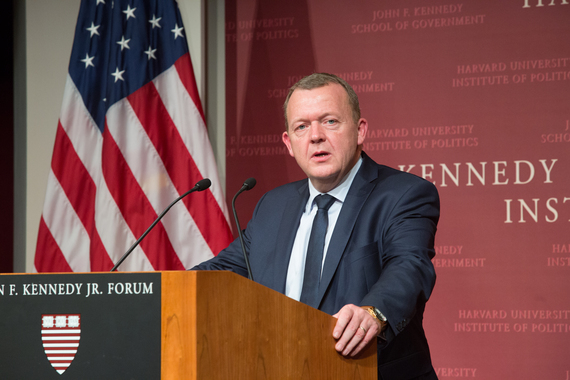By Madison Gonzalez, Harvard Class of 2018
Recently, Denmark was launched into the collective eye of the American public after presidential candidate, Bernie Sanders, referenced their "socialist" welfare model, noting that the US should look to Nordic nations as an ideal for economic reforms. On Friday, October 30, His Excellency Lars Løkke Rasmussen, Prime Minister of Denmark, addressed the John F. Kennedy Jr. Forum on subjects ranging from Denmark's economy to contemporary Nordic challenges and solutions.
I had the privilege to interview the Prime Minister prior to his address. Although the majority of our conversation would revolve around the strengths and limitations of the Danish social model, I began with an inquiry into Denmark's role in the Syrian refugee crisis, a subject in which the country has experienced much scrutiny since news articles emerged revealing a Danish anti-refugee ad campaign in Lebanese newspapers.
Prime Minister Rasmussen spoke in broad terms, citing Denmark's sizable per capita expense on humanitarian aid, campaigns against ISIL and the importance of forging peaceful solutions in Syria. Making no comment on the Lebanese ads, the Prime Minister emphasized that European communities should, "play a bigger role and push the U.S., Russia, Iran and Saudi Arabia ... to find the proper solution". To not merely shrug responsibility, Rasmussen added that the Danes would continue to "deal with refugees and take [their] fair share".
During the forum, Prime Minister Rasmussen spoke at length on the merits of the Danish model. He prefaced by citing the astronomical tax rates in his country, but referring to the system as "high cost, high return", allowing citizens to reap a plethora of benefits such as educational grants, a full year of maternity leave, extensive unemployment assistance and six weeks of paid vacation.
It's difficult to deny that the system has worked exceptionally well for Denmark. The country is one of the world's wealthiest, boasting high degrees of income and gender equality, a fantastic standard of living and a triple-A rating from Moody's. When asked about the country's swift rebound from the 2008 economic crisis, Rasmussen curiously likened Denmark to a bumble bee, listing exactly four reasons why the "Danish bumble bee was able to fly".
In short, Rasmussen attributes Denmark's economic success to (1) the social contract that exists between the government and its citizens, (2) broad public consensus regarding economic policy, (3) a flexible labor market and (4) a phenomenal business climate. Ultimately, the Prime Minister believes that it is the foremost duty of the government to "preserve the possibility of social mobility based in the idea of equal opportunity" via economic reforms.
In response to the comments made by Bernie Sanders, Rasmussen expressed hope that the U.S. and other countries can be inspired by Denmark's social planning, but noting that simply "copying and pasting" from Denmark is not the solution. Instead, Rasmussen advocates for a more admirable, and achievable, goal: the cooperation of the world powers in confronting global challenges, naming global warming as an example.
While an American transition to a Nordic style of governance is almost certainly not an option within the near future, Prime Minister Rasmussen presents a compelling case. The U.S. would do well to adapt and innovate with the same willingness and ease that Denmark exhibits.
----
Madison is a member of the Harvard College Class of 2018, pursuing a joint concentration in English and Government. She is a part of Event Support team on the JFK Jr. Forum Committee and writes for the Harvard Crimson. Nearly all of her free time is spent reading fiction, caffeinating and pining for the warmth of her Miami home.
